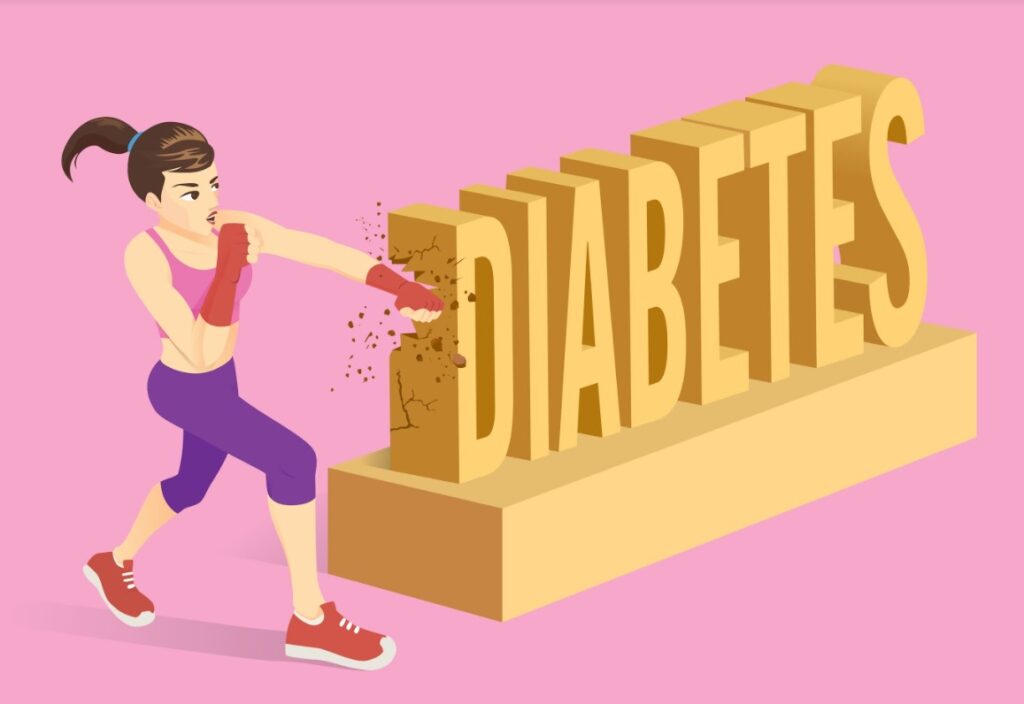Diabetes is a metabolic problem that involves the hormone insulin which is responsible for helping tissues in absorbing blood sugar from the bloodstream and transforming it into power. There are two primary kinds of diabetes: type 1 and type 2. People with type 1 diabetes do not produce blood insulin and need regular treatment to maintain their blood glucose level. Those with type 2 diabetes may be able to produce insulin but their tissues may not utilize it properly. As the disease progresses, their bodies may stop making insulin completely and they may also need treatment. In both the conditions, there can be high blood sugar or hyperglycemia. Diabetes can be diagnosed using HbA1c Test which measures a person’s blood sugar levels over the last two to three months.
Some common indicators of diabetes are:
- Excessive urination
- Increased hunger and thirst
- Weight loss
- Fatigue
- Delayed wound healing
- Genital itching or frequent yeast infections
- Blurred vision
Several people in the world have diabetes and even more than that number of people today experience stress. Let’s see what stress is, what are its symptoms and if there is a connection between diabetes and stress.
What is Stress?
Tension or stress is a basic condition that is a result of a mental or even bodily grief. It could result from sickness, trauma, any monetary problems, or other such reasons. Sometimes even small issues like being stuck in a routine or facing a traffic jam can also cause stress and anxiety.
Some of the common symptoms manifested by stress are:
- Anxiety
- Depression
- Headaches
- Muscle tension
- Sleep problems
- Fatigue
- Feeling generally unwell
- Irritability or restlessness
- Reduced motivation
Experts in the 17th century believed that there is a relationship between tension and diabetes. Let’s see if this hypothesis holds true even today.
Stress initiates a fight-or-flight reaction in our body in various forms. In its primary form, the body releases the hormones epinephrine (adrenaline), glucagon and cortisol. These chemicals send a signal to the tissues in our body to release sugar and turn it into power. They additionally decrease the release of blood insulin, which further increases the quantity of sugar in the bloodstream.
People with diabetes may not be able to eliminate this excess sugar properly, causing the blood glucose level to stay elevated. Anxiety and stress can lead to hyperglycemia, particularly in type 2 diabetes. If you have type 1 diabetes, you may additionally experience hypoglycemia (reduced bloodstream glucose) when under stress. In both the cases, stress hinders your body’s system to counter the increased level of hormones and your tissues take advantage of blood insulin as well as sugar.
Can stress cause diabetes?
Research in the last few years has shown that there is a connection between tension, stress, anxiety, anger and the increased risk of diabetes. Although stress is not a direct trigger for causing diabetes it has an indirect impact.

Persistent anxiety or stress can act as a trigger for people to change their habits as well as way of living. This may include eating unhealthy or junk food, reducing or completely stopping any form of physical exercise or increasing their liquor or cigarette usage. Every one of these aspects can support diabetes progression in the long run.
Can Stress Cause Flare Up the Symptoms of Diabetes?
People with diabetes experience the same everyday stresses that people who do not have diabetes also experience. However, in their case, diabetics also have to monitor their blood sugar regularly, watch their diet and take daily medication. Being diagnosed with a chronic health condition and managing that health condition can be stressful enough. This can sometimes lead them to neglect their treatment, not monitor their blood sugar level on a regular basis, reduce or stop their exercise regimen, or not have their regular meals timely. Increased intake of liquor and cigarettes can also have an adverse effect and cause a flare-up in the symptoms of diabetes. This is why people with diabetes need to pursue stress-management strategies that can help in preventing an increase in their blood glucose.
Monitoring Diabetes
It is important to monitor the blood sugar levels not only for people with diabetes but also for people who lead a stressful life. Regular checkups and blood work that includes tests such as HbA1c Test and FBS Test (Fasting Blood Sugar Test) can help you monitor your blood sugar level. An FBS Test measures the amount of glucose in your bloodstream at fasting levels.
Managing Stress and Diabetes Symptoms
There are several techniques to manage tension and you can find one or more than one that suits you. Some of the most effective stress-management strategies include:
- Taking time to relax and to do something enjoyable each day
- Relaxation techniques, such as breathing exercises and meditation
- Physical activity, such as cardiovascular exercises or gentle practices like yoga
- Seven to eight hours of sleep every night
- Effective time-management
- Taking support from family, friends and colleagues
- Talking to family, friends or therapist if required
